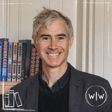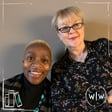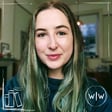Become a Creator today!Start creating today - Share your story with the world!
Start for free
00:00:00
00:00:01

#197 - Emma Glass
Literary fiction writer and paediatric nurse, Emma Glass is here to chat about her third novel, Mrs Jekyll and how she was commissioned to write it as well as the rest of her unusual publishing journey.
💖 Join the Patreon 🙏
Support the show and get access to the extended episodes and more!
📚 The Chosen Ones and Other Tropes 🥳
Jamie, Melissa and Noami talk about all things writing, tropes and publishing!
✍️ WriteMentor 🧑🏫
Get a whole month with WriteMentor's Hub for free using the coupon code 'Write&Wrong'.
🎙️ Zencastr 🎬
Click on this referral link to get 30% off your first three months with Zencastr.
Transcript
The Role of Writing in Plot Development
00:00:00
Speaker
Ooh, a spicy question. I love it. Because the writing is sort of everything. You can fix plot holes, but if the writing... So some readers love that and some readers are like, but I wanted more of this. So it's kind of a gamble.
Introduction to Emma Glass
00:00:14
Speaker
Hello, and welcome back to the Right and Wrong podcast. On today's episode, I am joined by author and pediatric nurse, Emma Glass. Hello, welcome. Hello. Hi, Jamie.
00:00:25
Speaker
Thanks so much for coming on. um It's a pleasure to have you here. Let's dive right in with your latest publication, Mrs.
The Origin of 'Mrs. Jackal'
00:00:33
Speaker
Jackal, which came out earlier this year. Tell us a little bit about it.
00:00:38
Speaker
So Mrs. Jekyll is is sort of every author's dream, I think. um It was a commission from a new publisher. and Being commissioned a whole book of fiction is, I think, quite rare a in in the publishing industry. and And I'm still not entirely sure how the good people of Cheerio found me for this commission.
00:01:07
Speaker
and But the yeah, I mean, it's it's really exciting ah to be asked to write something. and So Cheerio is a an independent publisher. They're led by um Harriet Viner and Claire Conville.
00:01:24
Speaker
Claire Conville is an agent and has an agency in in London. um But she was also great friends with the writer Deborah Orr, and who sadly passed away a few years ago from breast cancer. And and Claire was ah Deborah's agent and good friend. And when Deborah was in hospital towards the end of her life,
00:01:52
Speaker
and Claire was trying to keep her spirits up and, you know, was talking about writing and the thing that Deborah loved the most, and she had asked Deborah what she would be writing next, what what what was her next thing. And Deborah said, I don't know exactly what it is, but it's called Mrs. Jekyll, and it's writing itself in my head.
00:02:16
Speaker
And it was only a little while after that conversation with Claire that Deborah passed away.
Cheerio's Influence on Creative Works
00:02:23
Speaker
And so when and Cheerio were looking to to, and really thinking about the types of books they wanted to publish, so Cheerio, I should say, um are funded through the estate of Francis Bacon,
00:02:39
Speaker
and They're quite a small, small outfit looking to publish a handful and of books and commission a few short films a year. But the idea behind Cheerio and what they stand for is wanting to give writers and artists more of an opportunity to really create ah and innovate and do interesting things with art. So they're they're very and in the spirit of Francis Bacon in the sense that they want to create the unexpected, they want to create enduring art. and So it's a really wonderful thing ah to be a part of, or I guess a wonderful team to be a part
Feminist Themes in 'Mrs. Jackal'
00:03:20
Speaker
of. um But in order to honor Deborah's memory, they wanted to and commission
00:03:29
Speaker
a work of fiction in her honor, and it had to be Mrs. Jackall. So I guess they theyd looked around at different female authors and and wanted to find someone who could potentially fulfill the very ah brief brief. Can I say brief brief?
00:03:47
Speaker
The very brief brief, and to to basically create from that starting point, I it sadly never got the opportunity to meet Deborah, but I i know her writing and um I know her, so I sort of feel a connection when I read her work um with her working class background in Scotland, with her ah enthusiasm for language and her feminist ideals, I guess, that's something that really speaks to me. And just her just her story. um So when it kind of came i came my way, it seemed like too much of a good opportunity to turn down. And I'm just, yeah, absolutely thrilled and grateful that it's now published and and out in the world.
00:04:37
Speaker
Yeah. Wow. That's such an interesting
Challenges in Writing 'Mrs. Jackal'
00:04:40
Speaker
story. It reminds me, I'm sure it's, I mean, it's different in many ways, but it's, if I'm not mistaken, there's some sort of similar thing happened with the monster calls. I think Patrick Ness sort of um was was given that story ah by an author who'd passed away and had the idea and everything.
00:04:57
Speaker
Yes, yeah. It feels like very big shoes to fill. Yeah. That was in my mind when I when I was writing, you know, can I am I am I up to am I up to scrap to make am I going to do this justice as very much the soundtrack to writing Mrs. Jekyll? Yeah, I guess that's an it's an extra sort of level of of pressure and something to think about that you you wouldn't normally have whilst writing a book.
00:05:26
Speaker
Yeah, although I am the sort of person who constantly sits with a demon on her shoulder, no matter what no what ah no matter what sort of work I'm doing, um it's kind of sitting there saying, ah you are you doing your best? Yeah, no, I can understand that. There's a variety of demons that plague authors. Imposter Syndrome is a classic one. so You mentioned that it was a brief brief. How, you know, how short was this brief? Like, what was the, was it literally just like a paragraph or was it like a page? was it like
00:06:00
Speaker
Oh, I'd have loved a page. I'd have loved a page or a paragraph or a sentence. and No, it it literally was. um It literally was the title Mrs. Jackal. And of course, Claire and Harriet's very moving story um of their relationship with Deborah. and But the I guess the other so okay, so it maybe Maybe I'm umm being um not fully truthful here. ah imp Robert Louis Stevenson's A Strange Case, and The Curious Case. Oh my gosh, what's it even called? Doctor Jekyll. Strange Case, thank you. Doctor Jekyll, I must hide, is out of copyright.
00:06:45
Speaker
ah so Yes, which meant that ah it could be it could be used. and So i yeah, i did use I did use it. I used it quite a lot. Which which might be surprising um to anyone who's read both, ah because Mrs. Jekyll, I think doesn't really look like and doesn't really look like Jekyll and Hyde, but I i actually, because I found the brief brief so so brief and quite daunting, I went back to reading um Dr. Jekyll and Mr. Hyde. I had read it once before at school, which I feel like everyone who went to school in Wales, um probably in the UK,
Inspiration from 'Dr. Jekyll and Mr. Hyde'
00:07:34
Speaker
was at some point forced to read this.
00:07:38
Speaker
read this novel in school. and I had to read it, I think, in my GCSE year. And I remember it making a really strong impression on me at the time. And I seem to remember all kinds of things that when I went back to it um for this project,
00:07:58
Speaker
that actually didn't really exist and it really it really surprised me going back all this time later like maybe 20 years i also and realizing that a lot of the story that I feel I know has actually come from other aspects of media, like, you know, there's a lot of television um shows, I think there's a graphic novel, I think there's maybe cartoons, and Dr. Jekyll and Mr. Hyde in their various forms pop up all over the place in yeah films, other books.
00:08:33
Speaker
other, you know, television programs. and So I think my memory filled in a a lot of false gaps. So going back to read it, it's it felt very oblique. I hadn't realised that it was told predominantly through a different character's perspectives and through letters.
00:08:54
Speaker
and And that that actually helped me in terms of thinking about how I wanted to share and Rosie and Nola's story. So taking it out of time, out of context really, and and and sort of almost looking at each chapter as a a snapshot or a scene. And and then using the language um in the original text. So I must say I didn't actually really like it when I read it a second time.
00:09:25
Speaker
um I found it, well, firstly, there's very few women in it. The females in the story either get trampled to death or are made out to be um hysterical women. And I thought, hang on now, this isn't right. This has to change.
00:09:41
Speaker
and But yeah, what really did strike me about the original was ah Robert Louis Stevenson's sets of language. And so I went through a bat-filled copy with a highlighter and just highlighted the words and phrases that really spoke to me. And and they actually form the chapter titles. um And I don't think I would have been allowed to do that if the novel was still in copyright.
00:10:06
Speaker
Oh, that's really cool. That's a really great way of like paying sort of direct homage to to to the kind of inspiration without having to sort of bring it directly into into the writing. Because like you say, they're very different. And it like, if you just looked at the prose, it's a very different, you wouldn't immediately assume that it would be like a direct correlation.
00:10:28
Speaker
No. And I think the the publishers went weren't particularly um but weren't particularly bothered whether I did or didn't and use anything of the original. you know they they They truly wanted it to be in the spirit of Deborah. So um you know I asked very specifically around ah reframing the original. And they said, you know, no, it's entirely up to you. But there were other things that I felt really fit with what I was trying to achieve from the original. So it being set and in London, where I live, having kind of Victorian undertones. So, um you know, the use of spiritualism and mediumship,
00:11:14
Speaker
which was really a big part of Victorian life in England. And um I wanted to create a sense of London, which I think Robert Louis stevensson Stevenson does very well, and but also the heinous acts of both characters. So I wanted that to be mirrored. um in Mrs. Jekyll, the Hyde type character who I've called Nola, um you know, she does the bludgeoning, she does the trampling, there's all of the, I wanted it to match, kind of, or mirror um what the original characters were doing.
00:11:58
Speaker
Yeah, so yeah, it was definitely like, whilst you didn't stick to, and like you weren't trying to echo the structure or the pacing, you very much took a lot of the phraseology and you wanted to you wanted that to be like ah a mirror for the various things that happened. Yes, absolutely. Okay, are you a fan of um gothic horror kind of outside of Robert Louis Stevenson?
Gothic Horror's Impact on Emma's Writing
00:12:22
Speaker
Yeah, I think so. um I say I think so. It don't sound that convincing, do you? I think so because a lot of my my tastes in reading were shaped by school and university. And I think over the past few years of maybe um So, you know, I read a lot of the the classic golin Gothic literature, but my I haven't really found anything modern that makes me feel the same way. And so I think my tastes have changed slightly, but I
00:13:00
Speaker
um yeah I am quite interested in the Gothic, not necessarily in reading, but yeah I love a horror film and particularly if it's got a supernatural theme or if it's either an old horror film or one that's set in the past, I find that appeals to me.
00:13:24
Speaker
Okay, that's interesting. And you also mentioned um feminism is something that your previous novels have been that sort of tagged with, in the marketing at least, you know, a feminist aspect to them and that this novel as well, you wanted to get those feminist feminist elements in. Is it something that you consciously think about while you're creating a story? Is it or is it more just sort of um a, whilst you're writing it, it just comes out because that's, that's just who you are.
00:13:54
Speaker
Yeah, I actually feel like ah it to begin with, it wasn't a conscious thing. So which might sound surprising, because Peach is definitely in that sort of feminist canon. But when I was writing it, I i was actually I think my focus was really different. My focus was on the language and actually the story felt very secondary to that and also took a really long time to develop because I was just really taken with rhythm and pace and the flow of the language.
00:14:30
Speaker
ah feel like my i i think I feel like my my my own sense of feminism has grown alongside the writing. So whereas is it's not necessarily something that I sit down and go, you know, think this must absolutely have feminist themes, or it must be expressed in that way. But I feel particularly with Robert Louis Stevenson, i I was a bit angry about the, the I mean, it's not his fault, bless him, you know,
00:15:00
Speaker
he He didn't know. He was entirely ignorant, as was everyone, you know, so many years ago. And today... Was it 1880? 1890? I haven't got a head for numbers, but it's around there, I think. Yeah, so over 100 years ago. Yeah. And it's funny because there's still a long way to go. But I do feel now when I sit down to write, maybe not feminism specifically, but females are are present and how I present them and well i you know what i what I want to get across about their experiences now feels a lot more present in my writing. and At the moment I'm trying to work on um what will hopefully be my fourth novel, which in my head I'm thinking of it as a Welsh family saga, but I'm trying to write from the perspective of a
00:16:01
Speaker
middle to late age male alcoholic and I'm having to really step outside of my normal practice and workshop it with others a lot earlier because because I'm again being so and focused on the language and the rhythm and and sort of the intimacy of of his world. I feel like I might not be focusing as much on the women in the story and that's kind of part of um part of the point, but I don't want them to get lost and so I'm trying to check myself a bit more. So yeah, that's the very long answer to your very straightforward question. I think yes, I am trying to make a conscious effort in terms of how women are framed and what their experiences are.
00:16:48
Speaker
Okay.
Genre Blending in Publishing
00:16:49
Speaker
Yeah, yeah. It's just always interesting because sometimes I know that a publishing house or like the marketing team can just sort of stick labels on books. And it's not just with feminism. They they do it with all sorts of things. Like I've spoken to authors who they've said, you it's like, oh, I was just writing a story. I thought it was interesting. And then the publisher informed me that this was the genre. Like, oh, this is a psychological thriller. And the author's like, oh, is it? Okay, great. Yeah.
00:17:15
Speaker
Yeah, that but but that has that has happened. and I mean, that did happen with with Peach. I think I had very different ideas of where I thought that book should sit on a shelf in in a bookshop. um And I think I actually didn't really realise that literary fiction was a genre.
00:17:38
Speaker
um I knew, and you know, i I came into publishing, I think quite naive and and when and with just but sort of ah a lack of a broader view of, of books, because i'm I'm the sort of person and I'm very much drawn to covers. I'm also very much drawn to writers I feel safe with and, and yeah, I'm not particularly I don't do a whole lot of exploring. I don't think when it comes to to reading. So, um yeah, I i ah find, but I like the fact that um people see different things in the work. You know, Peach was such a surprise for me. And I think every novel going along, like I think of my second novel Rest and Be Thankful as a ghost story. And I'm told it's not really that, it's not really that.
00:18:29
Speaker
But it doesn't it doesn't really matter. I'm quite interested in um blending different different styles, different ideas, and ultimately giving the reader a little bit of a surprise. Yeah, I think as well the writer will always have a different perspective on a novel than the reader will because the reader is not privy to all of the information, all of the sort of extra stuff that has been thought about, that has like been either like cut, edited or never even written down, but is all part of that kind of world building that you've done as a writer.
Author's Presence in Texts
00:19:05
Speaker
So it kind of changes how how how how you see everything, you're so close to it. A reader will never be that close to it.
00:19:12
Speaker
Yeah, and I think and i think the the death of the author um idea comes into, I think about it, I think think about it a lot. That makes me sound really morbid, doesn't it? The death of the author.
00:19:27
Speaker
But I mean, I mean, specifically, I think about what um my my position as the author is in these texts, whether, whether I really matter to the reader, whether, and ah you know, and that's and that's having me just having said that I feel I am drawn towards readers that I feel writers that I feel safe with. um And i'm I'm not sure many of my readers would feel that safe with me, just because of the type of things that I write about.
00:19:55
Speaker
and But yeah, i I am interested in what me the author or you know other other authors, what they feel their positions are in the text and what and what that really means for the reader and and whether we should be present at all. I mean, it's really hard. um I've been thinking about this a lot.
Personal Experiences in Writing
00:20:19
Speaker
It's really hard to decide what bits of yourself you put in your novel or how vulnerable you are willing and able to be
00:20:31
Speaker
with readers in terms of you know drawing on your own experiences or drawing on the experiences of others that you've been party to or aware of. um I think as I become more experienced as a writer and as and as I get older,
00:20:48
Speaker
i I have a sense that I want to be more imaginative in terms of where the inspiration comes from. I feel having written three very ah I say very personal, but you know the the experiences that come through in all three novels are quite raw. And it then makes it really difficult for me to go to go back to those books. So and i i did ah I did a public reading recently and started to have a little bit of a crack in my voice and feel a little bit emotional. And that that feels very and vulnerable, but then
00:21:28
Speaker
I guess readers respond to that as well. I guess that's why people read they're looking to share emotions or experiences that they've not had themselves. But it's an interesting, and it's a very interesting position, um ah position to be in, you know, how much, how much bleeding do you want to do in front of an audience, you know, in terms of what you put on the page, it's, um yeah yeah, changes over time, I think, as well.
00:21:56
Speaker
But it's it's a credit to the authenticity of the writing. Like, the story obviously means something to you. And whether that's so it's something that actually happened, or if you're just sort of you've just created such a bond with the kind of characters in the world, that it does it kind of you've willed its existence into being.
00:22:16
Speaker
Yeah, almost like Dr. Jekyll. well exactly were willing the willing ah and yeah Willing another into being, or creating another. Yeah, it's i mean is fascinating. and i feel I do feel sad when i finish when I finish a novel, there's like an inevitable uh, an inevitable emptiness that you feel because you spend so much time in the world or in, in, in the mind of, of, of someone else. It's, um, yeah, it, it feels a little sad and it takes a while then to build up the energy. And I guess for me, the courage to kind of go for the next thing, you know. and Yeah. yeah to be fair I think I'm like that as a reader. oh oh If I read a really good novel, I'll finish it and then be kind of sad that I finished it and then have to build up the will to start something new because I'll be like, oh, I just want to read that again. But with this but if I could wipe my memory and read that one again, that would be great.
00:23:25
Speaker
ah few A few friends and then family members and have said after reading some of my some of my books, they have to gove down go and lie down in a dark room for a while afterwards. It's exactly how I feel after I've have have written them. ah I'm taking it as a compliment. I don't know why it's really hard to know what to say to that, isn't it?
00:23:49
Speaker
Well, I mean, I've always, you know, if you look at art or and creative things as a, the the the goal is to kind of trigger an emotional response. It sounds like you are triggering an emotional response.
00:24:03
Speaker
yeah I would say mission successful. Thank you.
Favorite Books and Influences
00:24:08
Speaker
And that brings us to the point in the episode where we will ship you off to a desert island and ask you, Emma, if you were stranded on desert island with a single book, which book do you hope that it would be?
00:24:21
Speaker
and So, I think I have two answers. Am I allowed but two answers? I'm not asking for two books. I wouldn't dream of asking for two books, but I have two answers. I recently went back to Virginia Woolf's Mrs. Dalloway, and okay I i So I fell in love with the language of that very short story um all over again. And it's something that I feel like I want to go back to again and again, because it's a very condensed world. You know, it's just a very short snapshot in time, but it's incredibly rich and creative, um the way Wolf brings in these different characters and just spends a couple of hours illustrating this,
00:25:13
Speaker
you know, very sad, but beautiful life of a woman. However, ah it will it only takes me about two hours, two and a half hours to read it. And if I'm stranded on a desert island, I'm going to need more than that. So yeah answer number two is, um either Stephen King's It or Stephen King's The Stand, firstly, so I can read it and be occupied for, ah and I know I've said two Stephen King books there, but instance with Stephen King, who I i love and admire, is much of a muchness, you know, the 1300 pages is 1300 pages. So either one of those big, heavy, ah heavy numbers, firstly to read and occupy myself for many, many hours and then to, and then to go back and edit. How can we condense this? exactly and Yeah, yeah, yeah. So hours, hours of fun there with a Stephen King novel.
00:26:17
Speaker
Wow, I think that is the first time someone has wanted to take it with them. say um Yeah, I mean, you ready really great choice. It feels like you have a much deeper connection with Virginia Woolf, but like you say, the sensible choice is to take long a long book with you on this journey. um Great answers though, I like both of those.
Closing Remarks and Promotions
00:26:43
Speaker
Next up, we are going to talk a bit about the writing process and Emma's publishing journey, but that will all be in the extended episode available on Patreon. um things will happen even if they're just small door doors or even windows opening, you can you can shimmy your way in. Yeah, no, absolutely. And I think that's ah that's a lovely sentiment to to end this this episode on. So thank you so much, Emma, for coming on the podcast and chatting with me and telling us all about your ah your quite unusual publishing journey, as well as the new book, Mrs. Jekyll, which is out right now. It's been really, really cool chatting with you. Thank you for having me. It's been a pleasure.
00:27:25
Speaker
And for anyone wanting to keep up with what Emma is doing, you can find her on Instagram, at emmas underscore window. To support the podcast, like, follow, and subscribe. Join the Patreon for extended ad free episodes and check out my other podcast, The Chosen Ones and Other Tropes. Thanks again to Emma. Thanks to everyone listening. We will catch you on the next episode.



















